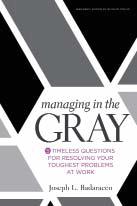How Resilient Are You? Machiavelli's Advice
By Joseph L. Badaracco, author, Managing in the Gray: Five Timeless Questions for Resolving Your Toughest Questions At Work
 Machiavelli is known as the high priest of sleaze. His big idea was supposedly that the ends justify the means — and any means are OK. But ask yourself a question. Would we even know Machiavelli’s name today if all he said was you can get ahead by being sleazy? This has been known since ancient times, and you probably know someone who got ahead, in part, by cutting corners … or worse.
Machiavelli is known as the high priest of sleaze. His big idea was supposedly that the ends justify the means — and any means are OK. But ask yourself a question. Would we even know Machiavelli’s name today if all he said was you can get ahead by being sleazy? This has been known since ancient times, and you probably know someone who got ahead, in part, by cutting corners … or worse.
Machiavelli’s enduring idea was something different. He said that leaders had to develop plans that would work in the world as it is. Put differently, leaders who aren’t pragmatic and realistic about how the world really works will fail themselves and the people who depend on them.
What is “the world as it is”? For Machiavelli, it was very much like our world today. It is a world of intense competitive pressure, smart people pursuing their self-interest, and lots of surprises, good and bad. In this world, responsible leadership requires resilience. You have to be resilient and so do your decisions and plans.
What does this mean in practice? I’ve studied, taught, and observed executives for years and focused on how the best leaders make uncertain, high-stakes decisions. As I see it, resilience means you have to ask and answer questions like these:
- DO I UNDERSTAND THE FORCE FIELD OF POWER AND INTEREST AROUND ME? In other words, have I thought realistically about who is likely to support my plans and who will oppose them? Have I thought about how much clout these parties have? In other words, who wants what and how successfully can they pursue it?
- AM I BEING MODEST ABOUT HOW MUCH I KNOW AND HOW MUCH I CAN CONTROL? When you make gray-area decisions in an uncertain world, you have to remind yourself that often the best thought-out plans can easily be upended. It’s important to follow President Eisenhower’s advice: “Rely on planning, but don’t trust plans.”
- AM I READY TO BE FLEXIBLE AND OPPORTUNISTIC? Machiavelli is typically viewed as a pessimist, and he did advise people to watch their backs. But a fluid world has happy surprises, and this means you have to be ready to modify your plans and seize unexpected opportunities.
- AM I WILLING TO PLAY HARDBALL? Generally, the best way to get things done is with analysis, persuasion, and goodwill. But sometimes leaders face persistent dissent or outright opposition. When this happens, you have to be ready to assert your authority — diplomatically but clearly. You have to be willing to say: “I’ve made a decision, this is what we are going to do, this is why, and I expect you to help us move ahead.”
- ARE YOU TEMPTED BY THE EASY WAY OUT? Machiavelli praised the entrepreneurs of his era. They were changing long-established ways of thinking about politics, art, human nature, and business. This is why he said, “Fortune favors the bold.” Resilience means taking prudent risks, shaking the tree a little, and seeing what you can accomplish with courage and determination.

